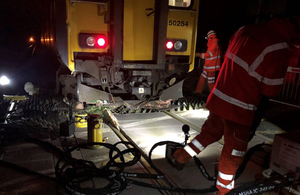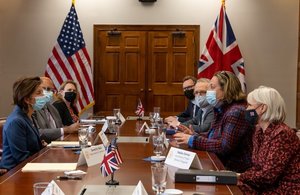- Two-thirds of tourists to the UK are influenced by locations and landmarks from British made films and TV programmes
- £1.32 million from the UK Global Screen Fund will be shared between nine more international co-productions, helping to increase their reach abroad
Research commissioned by the Department for Digital, Culture, Media and Sport’s UK Global Screen Fund has shown that UK film and TV play a vital role in influencing positive international opinion of the country and attracting global viewers to visit our world-famous locations and landmarks.
Nearly three-quarters (70%) of global audiences recognise “Britishness” as a mark of high-quality, with a third (30%) of adults saying that British film and television influences their view of the UK which is a testament to the sector’s ability to showcase British talent with international success.
The research across 15 international territories also showed the positive impact of producing films and TV series in the UK. Two-thirds (66%) of people who have previously visited the country said that seeing British locations and landmarks in film or TV influenced their decision, showing the huge indirect impact of the UK screen sectors on other parts of our economy, including tourism and hospitality.
This valuable research comes as nine more co-productions are set to receive a share of £1.32 million from the £7 million UK Global Screen Fund, administered by the BFI. Supporting UK producers to become partners in international feature films, animations and documentaries, this funding is increasing their ability to reach international audiences, creating more skilled jobs, and boosting the long-term reach of UK content on a global scale.
Minister for the Creative Industries, Julia Lopez, said:
The UK independent production industry is world-leading, consistently serving up innovative, creative and inspirational content for big and small screens that wow audiences across the globe.
Thanks to our brilliant UK Global Screen Fund, we are helping to create skilled jobs and boosting the UK’s international influence, which has a positive knock-on impact on tourism and the wider economy.
The nine productions benefitting from the UK Global Screen Fund awards include The Miracle Club, a UK/Ireland official co-production starring Maggie Smith, Kathy Bates and Laura Linney, The Tutor, a UK/Germany official co-production, and Ghastly Ghoul, a UK/Ireland TV animation.
Previously announced grant recipients include My Happy Ending, a UK/Israel official co-production, starring Miriam Margolyes and Andie MacDowell, which has recently wrapped production in Wales, and The Coop Troop, a UK/China/France animated co-production, which is now in the principal animation stage in Northern Ireland.
To further boost the international impact of UK film, television and video games, the UK Global Screen Fund has also supported the development of new branding to promote screen content around the world.
ScreenUK is an eye-catching and distinctive new brand to showcase and celebrate UK screen talent which will launch as a digital campaign, rolling out internationally over the coming months. Aiming to highlight high quality UK film, television and video games under a single brand banner, it will help distinguish and promote British content to international audiences.
Neil Peplow, Director of International, BFI said:
This extensive global research shaped how the new brand ScreenUK was developed, giving us valuable insights into how people around the world see us. When it comes to creativity and storytelling, the UK consistently produces outstanding talent and content and this report underlines how influential the UK film, tv and games sectors are on the global stage. We now have a huge opportunity to build on this reputation and show the full breadth, diversity and innovation we can offer to audiences, and support our screen businesses to succeed internationally.
Adeel Akhtar, star of Ali and Ava, said:
British independent film, unlike any other independent film from around the world (…) feels like it does act as a window into reality. Whether you’re watching a Ken Loach film, or a Mike Leigh film, a Clio Barnard film, it’s almost like you can open up a window in those places, actually open a window, and experience what it’s like to be living in those areas in those parts of Britain.
Gugu Mbatha-Raw, star of Belle, said:
There’s so much heart and authenticity in British films because they’re often passion projects, they’re labours of love. There’s such a rich culture here, and such a deep culture of storytelling.
ENDS
Notes to Editors:
For more information on the UK Global Screen Fund, please visit the BFI website.
To see the UK Global Screen Fund commissioned research ‘International Perceptions of and Engagement with UK Screen Content’ from by the BFI please see the report on the BFI website.
Full list of funded co-productions:
- The Miracle Club, an Ireland/UK co-production starring Maggie Smith, Kathy Bates and Laura Linney. The feature film is produced by Chris Curling/Zephyr Films with Irish producer ShinAwil Limited and funding from Screen Ireland. It is being Executive Produced by Embankment Films.
- The Tutor, a Germany/UK co-production directed by acclaimed British television director Alice Troughton in her feature film debut. The film is produced by Camille Gatin/Poison Chef and Cassandra Sigsgaard/Jeva Films with German producer Judy Tossell / Egoli Tossell Pictures and funding from German regional funds, in association with Film Constellation.
- Drift, a UK/France co-production by Fortyninesixty Films and La Cinéfacture with Greek producer Heretic Films participating as a third party co-producer, as well as Cor Cordium in the US. It will be directed by Anthony Chen and will start principal photography in the UK in March 2022.
- The Ghastly Ghoul, co-produced by UK producer Lupus Films and Irish producer Dream Logic Animation Studios. This animated Halloween special is written by Emma Hogan and based on a story by Kealan O’ Rourke. It will be directed by Kealan O’Rourke and Maurizio Parimbelli with assistant director Corinne Ladeinde. It will start principal animation at the end of January 2022.
- The Settlers, produced by Quiddity Films/Emily Morgan in the UK, is a co-production with Quijote Films in Chile, Rei Cine in Argentina, Cine-Sud in France and Snowglobe in Denmark. The feature film has funding secured from INCAA, CNCA and CNC Cinema Du Monde, and is also supported by IBERMEDIA and the Torino Film Lab. The project, directed by Felipe Gálvez, is joined by casting director Jessie Frost and will be sold by MK2 Films.
- Merkel, a co-production between the UK, Germany, and Denmark. The UK producers are Passion Pictures, Odd Girl Out Productions and the Scottish production company Sonja Henrici Creates. The German producer is LOOKSfilm and the Danish producer is Sigrid Jonsson Dyekjær p.g.a.. This feature documentary about the outgoing German chancellor Angela Merkel is directed by Eva Weber.
- Elephant Mother, a documentary co-production between the UK and Canada. Bungalow Town Productions is the majority co-producer with Canadian Inigo Films.
- Stolen, a co-production between the UK and South Africa. The feature film is co-produced by the UK producer Shantelle Rochester of Ida Rose with South African Uzanenkosi Mahlungu of Ants Multimedia. Michael Landes and Marsha Thomason are attached for the lead roles and it will be directed by Sheridan De Myers. The film is in receipt of funding from the South African fund Kwazulu Natal Film Commission.
- Bring them Down, a co-production between the UK, Belgium and Ireland. The feature film is co-produced by Stray Bear Productions, Frakas and Tailored and will be directed by Chris Andrews. MUBI, Screen Ireland and BAI (Broadcasting Authority Ireland) are all contributing to the finance of the film.

